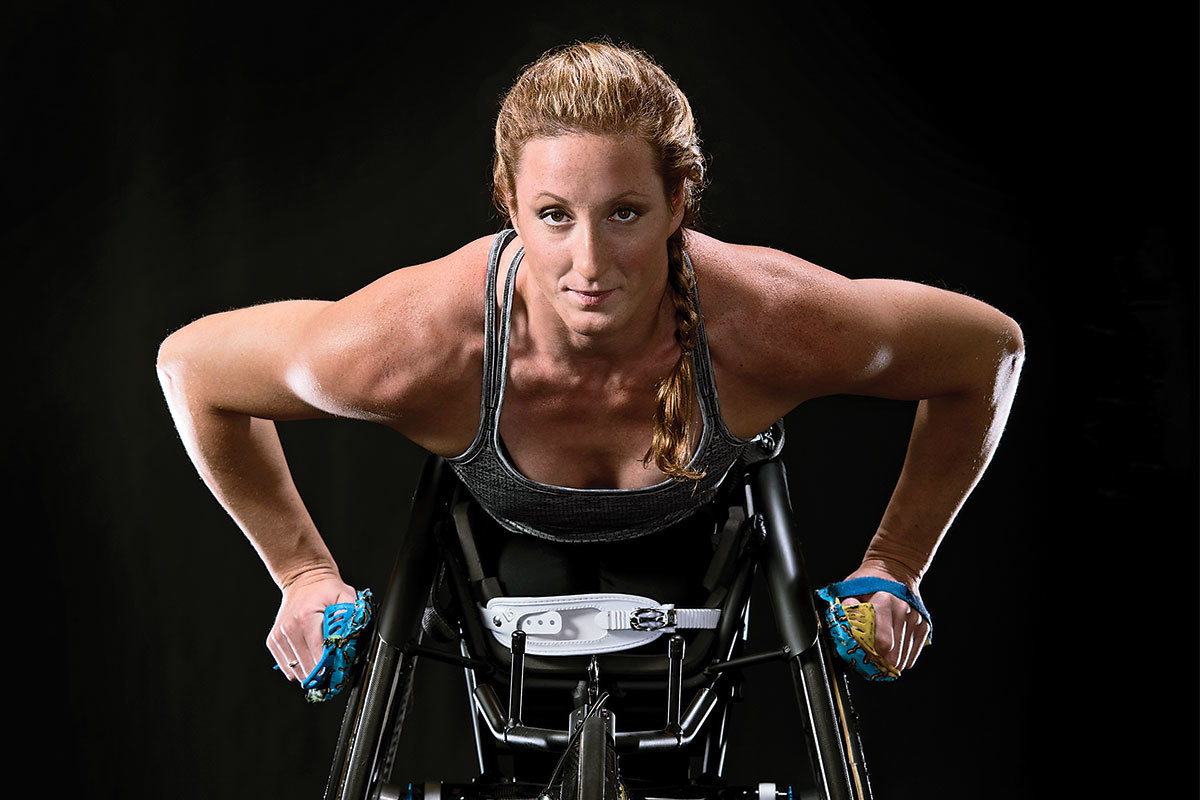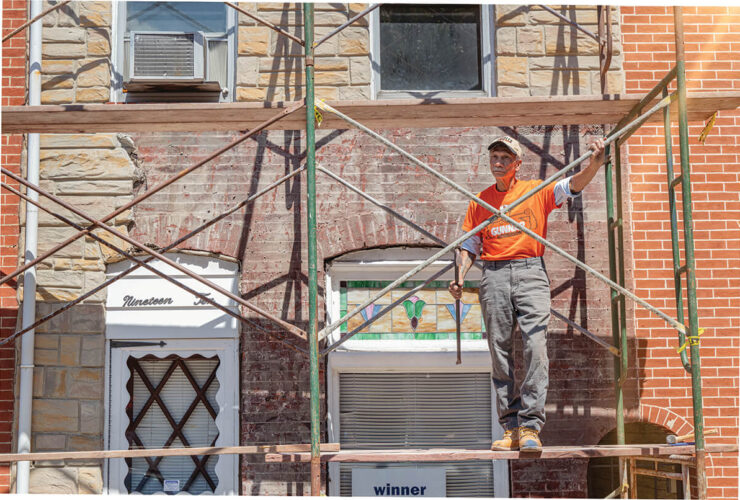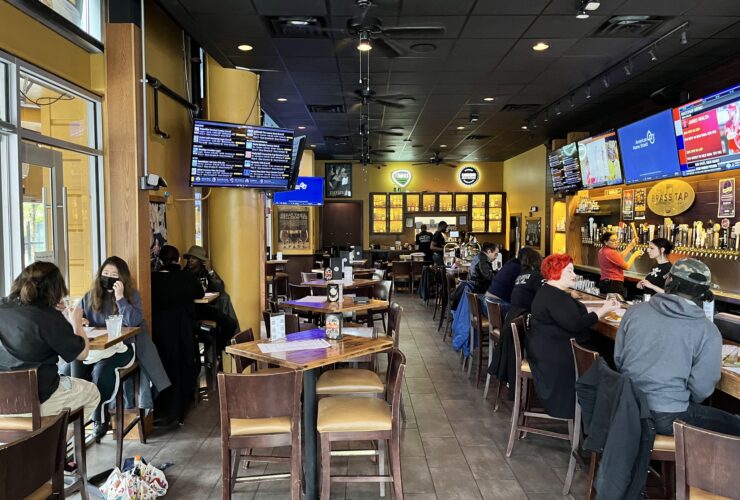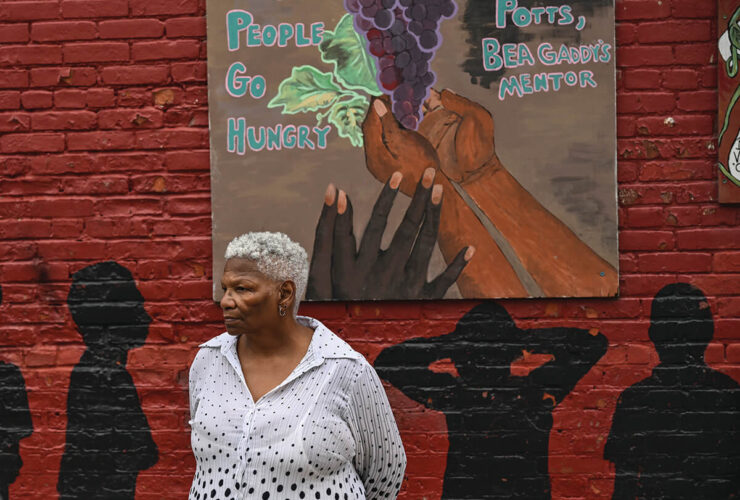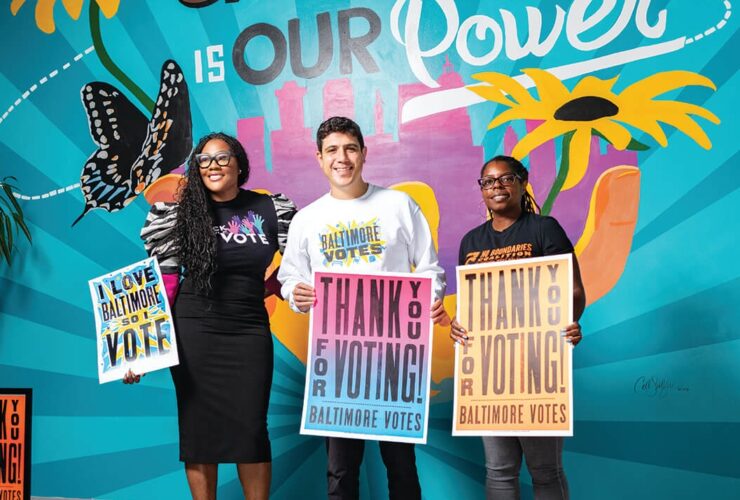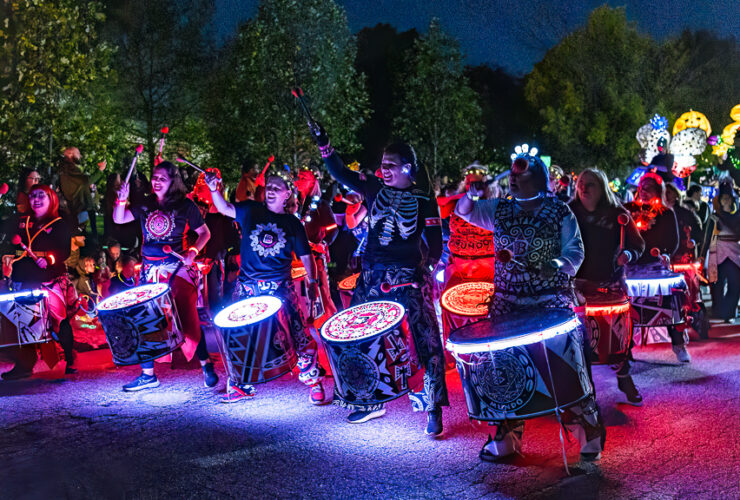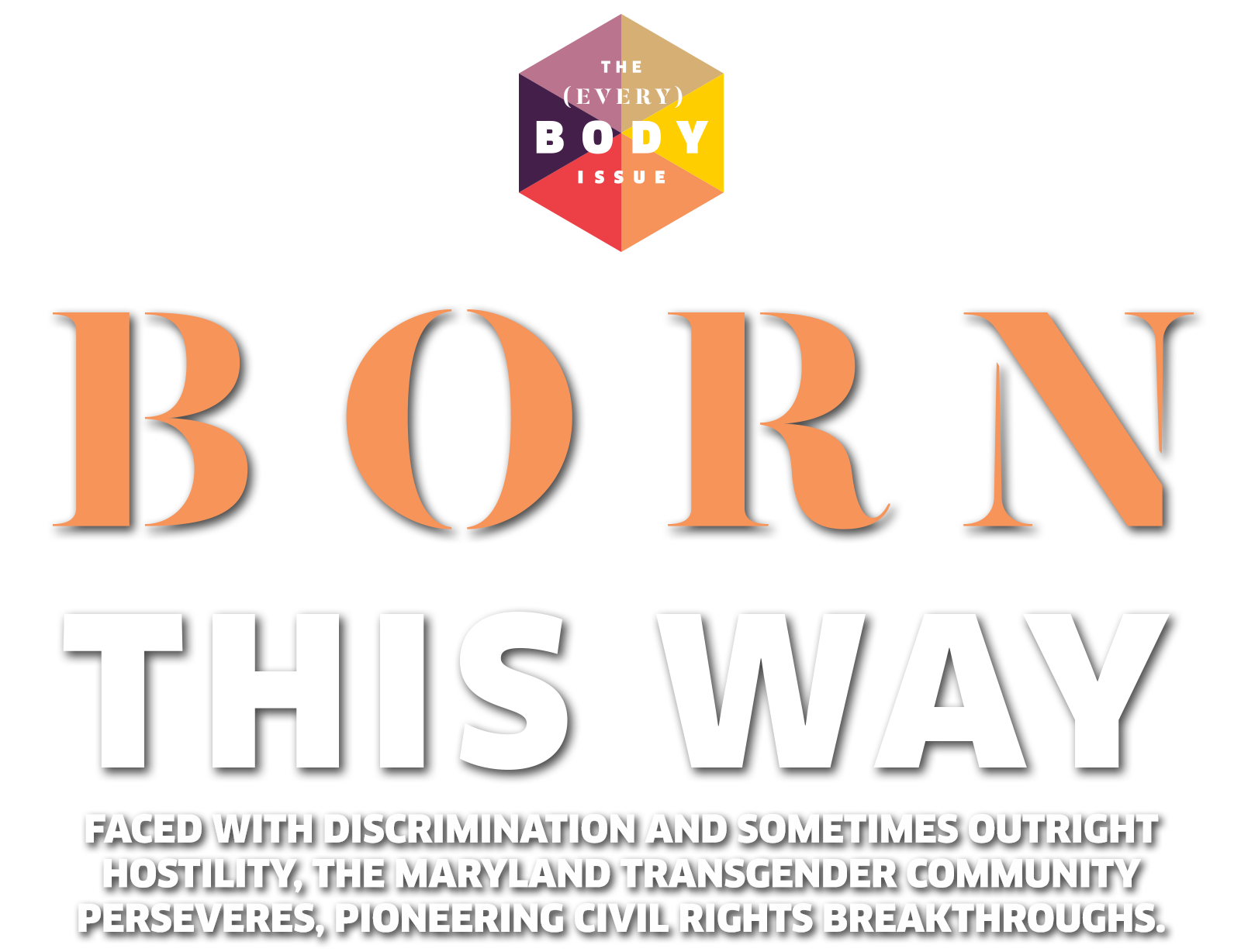
News & Community
Born This Way
Faced with discrimination and sometimes outright hostility, the Maryland transgender community perserveres, pioneering civil rights breakthroughs.
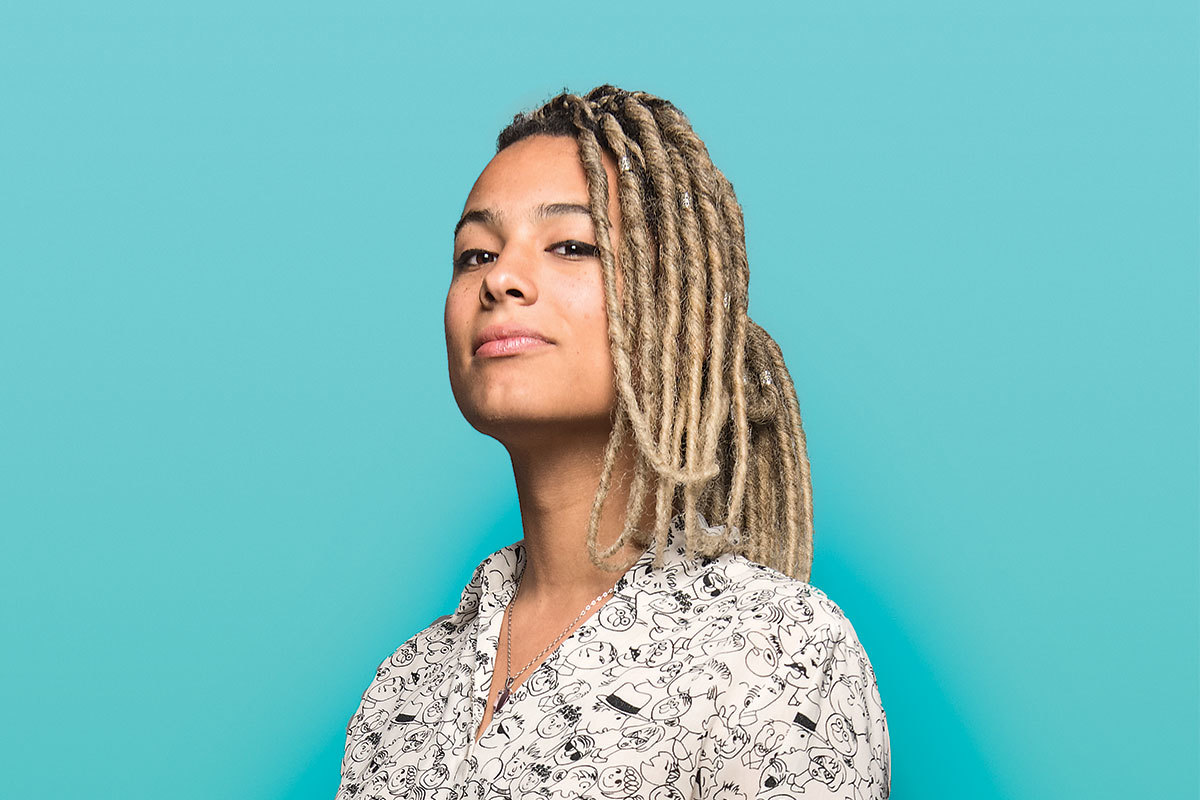
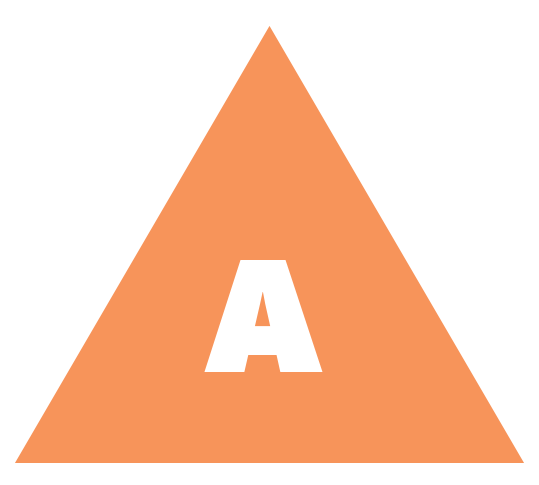
ssigned the female sex at birth, James Van Kuilenburg came to the realization at 12 years old, just as puberty began its onslaught, that he was transgender—a boy. Then living and attending middle school in Shepherdstown, WV, he shared his revelation with several friends, who proceeded to “out” him to the entire school, including the faculty and administration, which had very little experience with LGBTQ students. The principal, James vividly recalls, summoned him to his office, sat him down, and told him that he had to Google "transgender" to find out what the term even meant. “He showed me a Wikipedia definition of transgender on his phone asked me, ‘Is this what you are?’” remembers James, now a 17-year-old senior honor student at Governor Thomas Johnson High School in Frederick. Later, the principal informed him that he could no longer take gym class, which is a state requirement, and could only use the restroom in the nurse’s office.
“I didn’t have anyone to trust at school. Not other students. I was bullied pretty badly,” he says. “I couldn’t trust the teachers; they had reported me to the principal. I couldn’t trust the principal who had called my parents. I’m 12 and feeling really scared. Really alone. I mean, was the way I felt so strange that the principal had to look it up on his phone?”
This past June, spurred by a grassroots effort led by James and his mother, Nicola, after the family relocated to Frederick for James' schooling, the Frederick County school board passed a pioneering policy that recognizes a student’s right to be referred to by their preferred name and pronoun and granted access to the restrooms and locker rooms consistent with their gender identity. Called “Creating Welcoming and Affirming Schools for Transgender and Gender Nonconforming Students," the action, also known as Policy 443, addresses discrimination, harassment, and bullying of transgender and gender-nonconforming students. It also prohibits dress codes based on gender and requires school personnel who work with students to participate in training that covers gender expression and identity.
“Frederick does not have a reputation as the most progressive county in the state, but James and Nicola, the two of them, became incredible transgender activists,” says Nick Steiner, an attorney with the ACLU of Maryland. “They created a groundswell of support. The policy they helped pass is groundbreaking in Maryland. I am only aware of a couple of others like it in the country. The hope is that it can be replicated in other counties in the state.”
Nicola Van Kuilenburg wept as the school board announced the decision. “To go from a place a few years before, where you are worried about your son’s safety, his ability to pee while at school—the basic stuff of existence—to watching five board members each explain why they were voting for this policy was incredible,” she says. “It told me they ‘saw’ my son. That he mattered to them as much as any student in the school system.”
In many ways, the fight for transgender equality is in its infancy. But the victory for the Van Kuilenburgs, along with other LGBTQ students in Frederick, and their families and allies, was not the only watershed moment for equality in Maryland in the past year.
In November, a federal judge in Baltimore issued an injunction temporarily blocking President Trump’s ban on transgender Americans serving in the military, ruling on behalf of Petty Officer 1st Class Brock Stone, an 11-year Navy and Afghanistan veteran stationed at Fort Meade, and five other transgender service members. Afterward, Stone said that he was only seeking “the opportunity to continue to serve his country as long as he remained qualified” and that he wanted his fellow transgender Americans to have the same opportunity.
Recently, after the annual Transgender Day of Remembrance march and rally in Baltimore—there have been 14 transgender homicide victims in the city since 2005—Jamie Grace Alexander (pictured, opening spread) said that she has garnered a sense of resiliency from her mentors in the LGBTQ community. Tragedies, such as the murder of 38-year-old Alphonza Watson last year, are heartbreaking, but the political ups and downs should not be dispiriting.
“Instead of taking a reactionary attitude—feeling you have to respond each time a politician or an institution wants to marginalize trans people—it is more important keep building community every day,” she says. “I love my community.”
Ava Pipitone, executive director of the Baltimore Transgender Alliance, says more than anything, transgender individuals simply want to be in charge of their own lives. “And tell their stories in their own words.”
What follows are four of those stories.
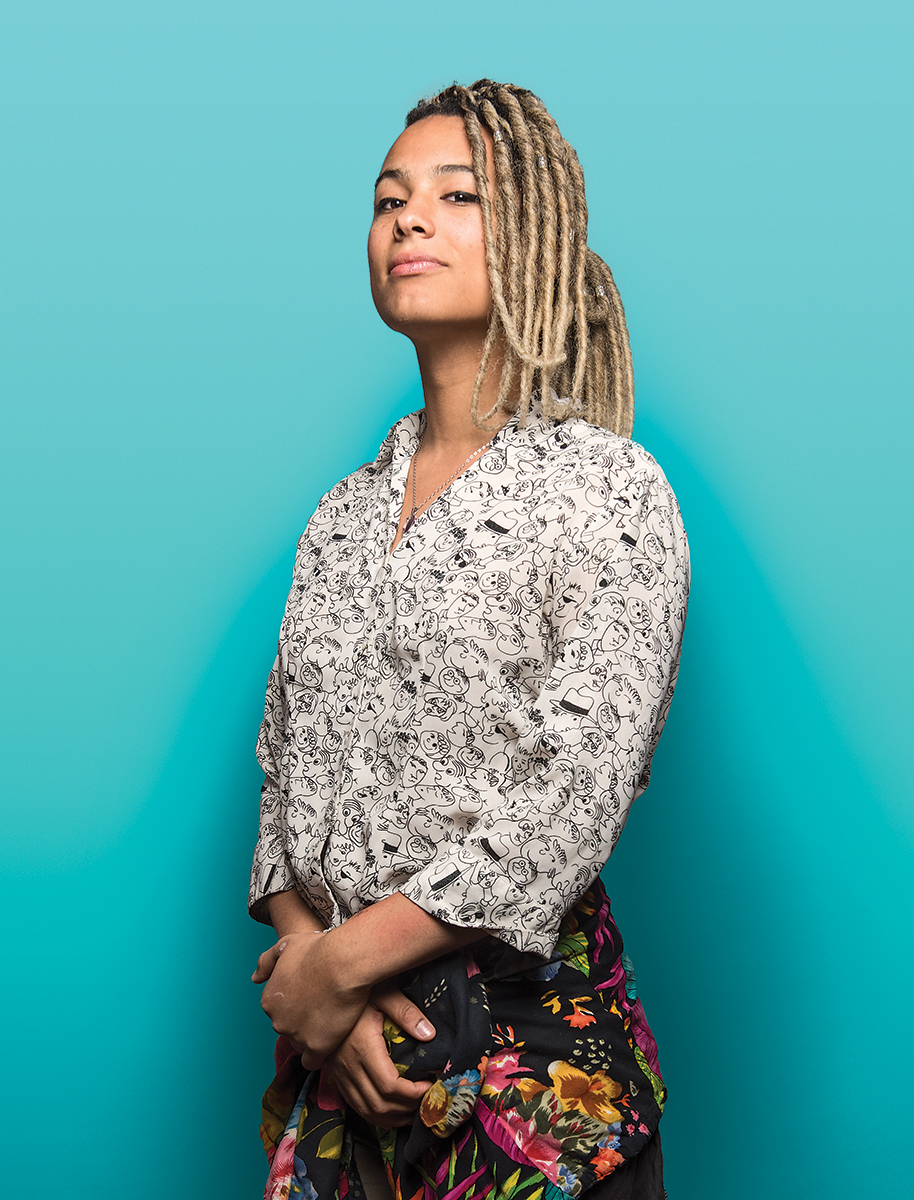
jamie alexander
Public heath administrative assistant, student, poet, 19
I work with Native America LifeLines, a health care nonprofit. I’m also a communication writer for The Baltimore Transgender Alliance, sharing its stories on social media and handling press releases. I’ve been doing that for six months, and unofficially for the past year. I am from Bel Air and always wanted to get to know Baltimore, and that’s why I decided to go to UMBC. For me, moving to Baltimore meant a chance to interact with different groups of people without compromising myself. I knew I wanted to be around black people and experience those relationships. I probably fell in love with Baltimore more than I should have.
I think being trans matters a lot. It also doesn’t really matter. My trans identity just allows me to be myself. Once I came out as non-binary, people stopped expecting me to be one way or another. I’ve always been a queen. In pictures when I was 4 or 5, there I am sashaying with one hand over my head. I’m also a product of an interracial marriage and have distinct memories of everybody in my life, my family, wrestling with that fact that I was black and I was queer—before I had come to terms with those two things. Before I had the words to understand those things. I wanted to be a gay man when I was younger. That would have been easier. But the trans identity allows me to explore different aspects of myself, and being around other trans people, I get to engage in those discussions.
I don’t know how I feel about being 19. I had to grow up fast, but I also had some really good mentors. I’m not the kind of person who waits for things to happen. I learned very quickly how to respond to racism and discrimination and how to speak up to people in power when they were wrong.
Resiliency is real. It’s awesome. Whatever we go through, it is all for the best if we are being authentic.
I do a lot of outreach to youth. Of course it is hard, I tell them. But it is also less hard than you think. Resiliency is real. It’s awesome. Whatever we go through, it is all for the best if we are being authentic. You’ve got to try to be your most authentic self. And, for me, that means I can’t be a cis-male. It is not an option. Not realistic. Only when you are being yourself can you feel good. When you are not connected to your true self, not connected to your body, you feel like a ghost. It is not comfortable at all. In terms of romantic relationships, no one will ever love the real me if I’m not myself. Really, all the relationships in my life will be off-center if I am not myself. Everything will be askew, and that’s how things felt for a long time.
Trans people definitely have a different understanding of how the body and mind work. We have a whole different set of chemicals surging through our bodies. And it opens up other questioning. If I suddenly have a vagina, am I suddenly a cis-person? One reason why I think trans rights, and working for trans rights, is so important is that opens up a dialogue to talk about certain issues. What is gender? What does it mean? I wouldn’t want to be anything other than trans. Everything I have, my friends, my job, my relationships, I have because I’m trans. It just feels right. I know people who like me, like the real me.
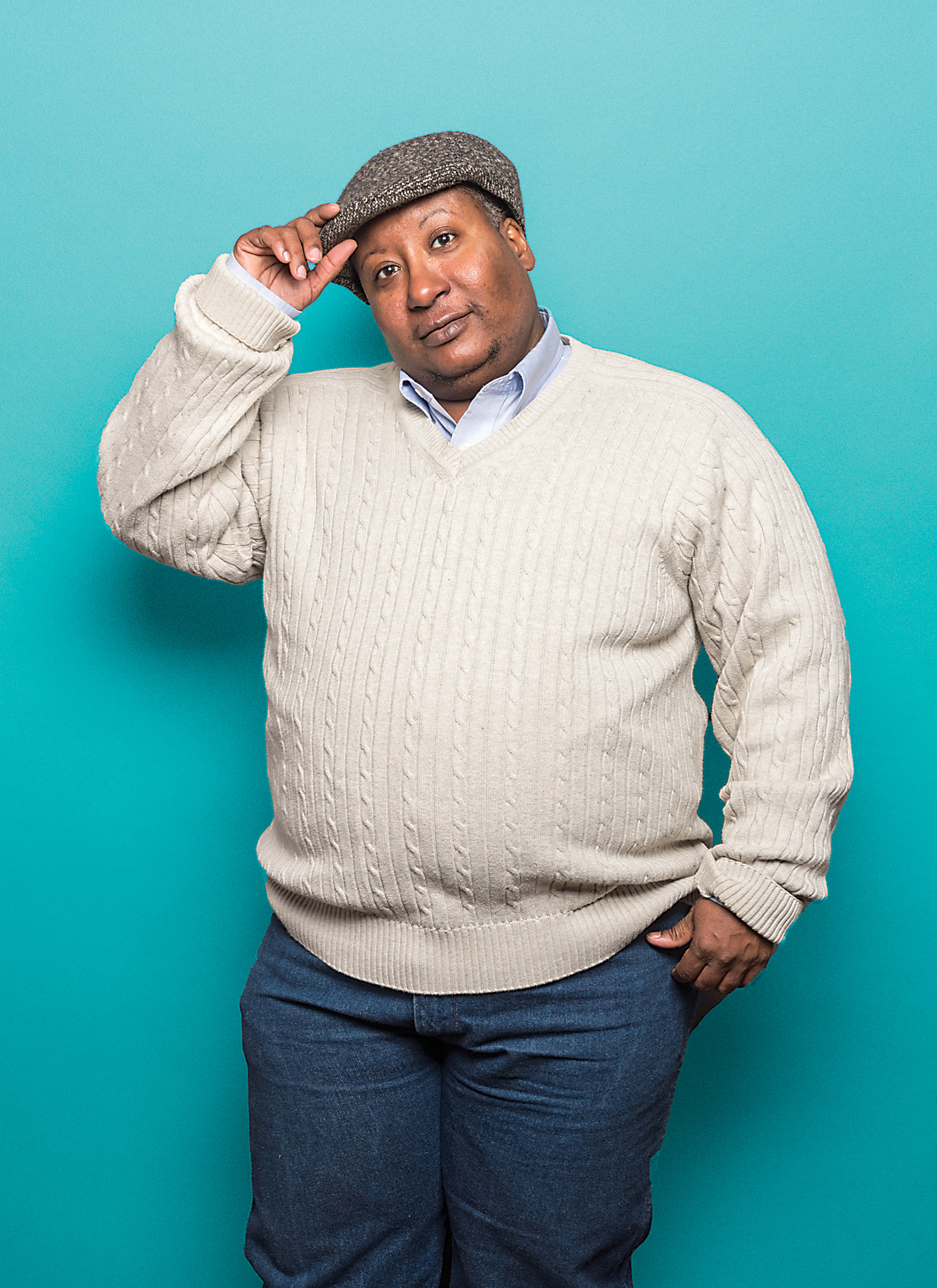
ken jiretsu
Community health program director, advocate, parent, 46
I am a single, but recently engaged, father of four special needs kids—I gave birth to them all before I transitioned, which was a little more than three years ago. My oldest is 24, two are 18, and my youngest is 16.
I grew up in East Baltimore. When I was 12, around the time puberty kicked in, I knew something was totally different with me. I knew I had an attraction to girls, but I didn’t feel like a lesbian. I felt like a boy. I liked everything they were doing, not the girls. I liked track, baseball, playing the drums in the band. I was a tomboy.
I told my mother the personal stuff that was going on as a teenager, but it went over her head—the term “trans” wasn’t around. I thought about my identity and a sex change a lot. I even had a male name picked out then. There just wasn’t anybody to talk to. No one in my family. Not because of religious beliefs or anything like that, just a lack of education. It took a toll on me. I eventually got into a relationship I wasn’t really interested in—with my children’s father—and then was dealing with domestic violence. When I got out of that, I was in my 30s, and I stepped back and did some soul searching. I needed to figure things out. Did I identify as a lesbian? No, that wasn’t it. Was I bi? No. I fell into depression.
Right before I turned 42, I found a good therapist and the result was I started living for myself instead of trying to be a people pleaser. In the spring of 2014, I attended a B’More Proud program at Johns Hopkins, got some information, and sat in on a Transgender 101 group. And then I sat in on another workshop where two men told their stories [of transitioning]. “That’s it,” I realized. “That’s me.” And I learned about Hearts & Ears, a support institution, where I work now.
Eventually, I got assistance from FreeState Justice and changed my name, which changed the way I felt about myself. You get to start all over in a way—even though there is still baggage. When someone refers to you by your “dead” name, for example, or the wrong pronoun, it can be emotional. One of the worst experiences I had was at the child support office. I had to tell them I had changed my name and I couldn’t cash the checks anymore. I explained to the woman that I had a new name and was making a gender transition. She looked at me like I had two heads. Then she said she needed to talk to her supervisor, and she walked through a glass door and I watched her tell her colleagues. All you could hear was the outpouring of huge laughter. Back then, even a little snicker would make me so mad. I’m still on the defensive when I go there. I do find inspiration in the people that have done this and gone before me.
The dysphoria comes from people not seeing me as I see myself. You don’t want that to affect you, but it does.
There are so many changes—emotionally, physically, mentally—with testosterone, which has been prescribed to me. I am not the same person I was three years ago, but I am calmer when I am on an even dosage. My self-esteem has come up. For some, transitioning happens fast. You see physical changes, like facial hair, immediately—for others, like me, it takes time. I have facial hair now, but still get misgendered all the time. I use it as a teaching tool. I also still deal with gender dysphoria. For me, it’s with my upper body. Some get surgery, a double mastectomy. I am not there, yet. But I am also not comfortable walking out my door with a tank top or a V-neck, even with my chest bound. The dysphoria comes from people not seeing me as I see myself. You don’t want that to affect you, but it does.
As far as my family, my 18-year-old son is gay and my 16-year-old daughter is bi. So with two LGBTQ children, we have been talking about these issues all along in our household. My daughter calls me Dad. The boys call me Ken. My mom is cool. She’ll say, “She’s my son,” mixing pronouns sometimes, but then she’ll correct herself. My dad is taking time. There was a period when we weren’t talking, but we are having conversations. And he’s been friendly to my fiancé. “I’m learning,” he says.
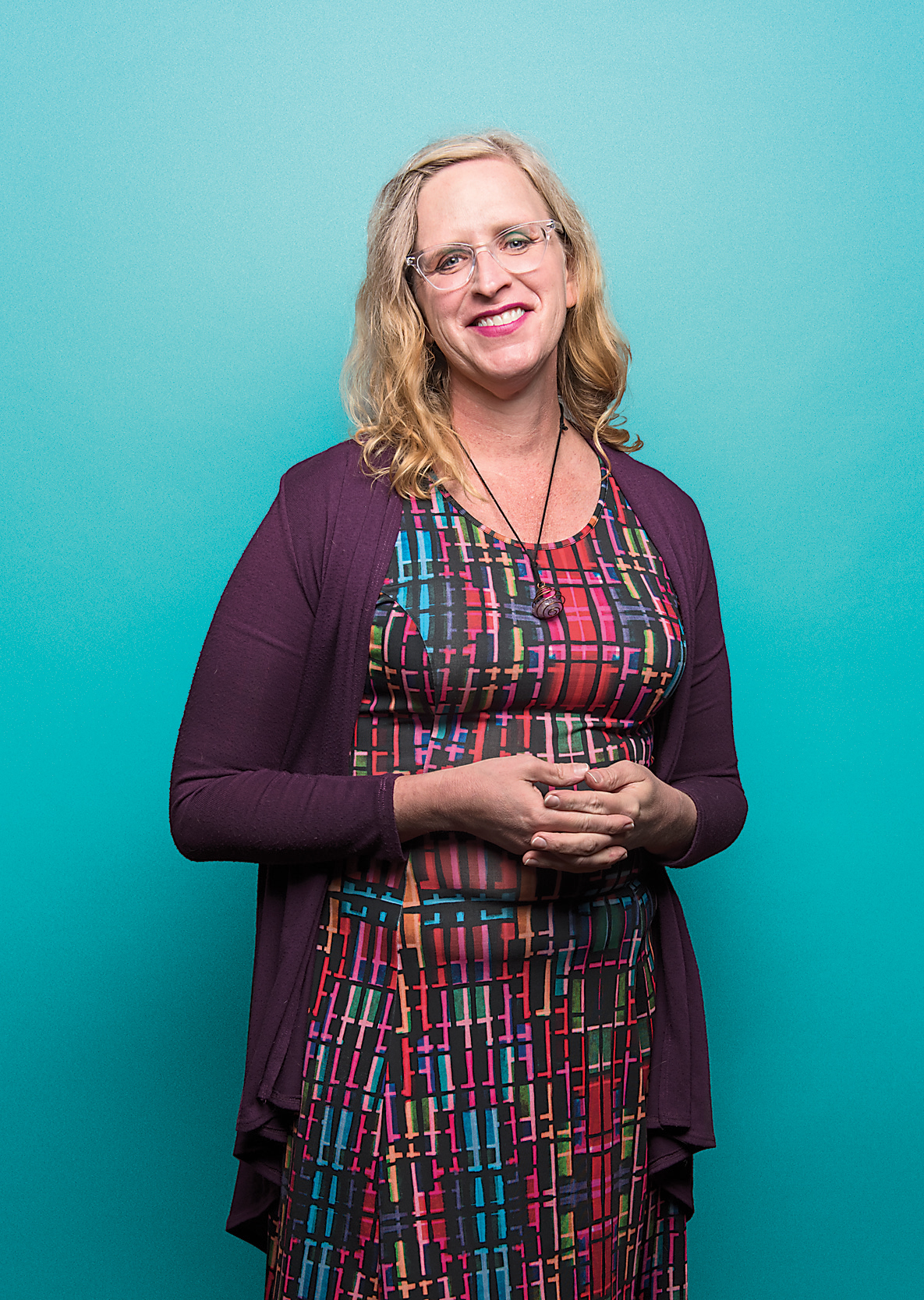
rahne alexander
Artist, performer, producer, 48
I was raised in California’s Central Valley to Mormon parents and lived in California until 2002, when I moved to Baltimore. I was pretty clear about my being a girl as a child. I tried on my mother’s clothes and things like that. I didn’t particularly like wearing my mom’s clothes, but that was because her style wasn’t mine. I read a lot as a kid—my best friend was always a book—and I discovered “trans” was a thing by the time I was 8. I also had misgivings about that patriarchal Mormon church early on and realized I didn’t want to engage in that.
While I knew who I was at a young age, I also recognized that I needed to stay on the traditional path in rural ’80s California, which was terrifying, to survive. Growing up queer in the 1980s, during the HIV/AIDS crisis, it was not a time when being different was going to be taken lightly. I made a deal with myself that once I got through high school and college, then I’d become my real self. There wasn’t a lot of information about being trans in those days. I’d go to the library looking for bits of information, finding a footnote here or there about making a medical transition. LGBTQ didn’t exist yet as a term, and even in the gay and lesbian community, I was an outsider. It got easier as time progressed.
I had been working on social justice issues in Santa Cruz, but when I came to Baltimore, I focused on building an arts career. I was deeply involved in the Transmodern Festival (which included artists and works that defied cultural norms before ending a 13-year run in 2016), where I performed, curated, and hosted. Similarly, I’ve done a lot with Charm City Kitty Club, a volunteer collective that showcases queer talent. There didn’t seem to be a large enclave of queer artists when I got here, although I know there had been earlier. Today, Baltimore feels like it is unique, like there is collaboration between the queer and straight communities in the arts. I’ve made a lot of good friends here and recently joined a new band, Santa Librada, which is exciting, after being a founder of The Degenerettes. We’re all chicks. Women in their 30s and 40s. A straight-up rock band. And I find myself writing some of the most exciting work I’ve ever done.
For me, waking up every morning in the wrong body was a big burden of sadness to live with each day.
For me, each day was hard as a transsexual (before hormone treatment and later surgery). I don’t speak for anyone else—everyone has their own relationship with their body—but for me, waking up every morning in the wrong body was a big burden of sadness to live with each day. I started my transition when I turned 23. I came out. I changed my name and dressed as a female full-time in public. I couldn’t start hormone therapy until five years later because of all the financial, medical, and insurance costs. And then, another 20 years later, I was able to get the surgery, which I just completed and took almost two years. I had been determined from a young age to somehow find a way to medically transition, but even with support from friends and family it had been out of reach.
Never did I think that I would see the day that an insurance company would cover transition surgery, which because of Obamacare changes, CareFirst BlueCross BlueShield began covering in 2015. I had begun to make my peace that it would never be accessible as I got older. I couldn’t even get the initial psychological treatment covered in the ’90s. As a rule, transgender people don’t have great employment opportunities, either, so insurance coverage has been always been an obstacle to any medical treatment. I’m grateful.
Something else I never thought would happen: My spouse and I got married a few months ago in front of our friends and family at the Metro Gallery. Our first date had been at a bar called BAR in Fells Point. We’ve been together for 14 years. That was huge. That was amazing. Shocking and glorious.
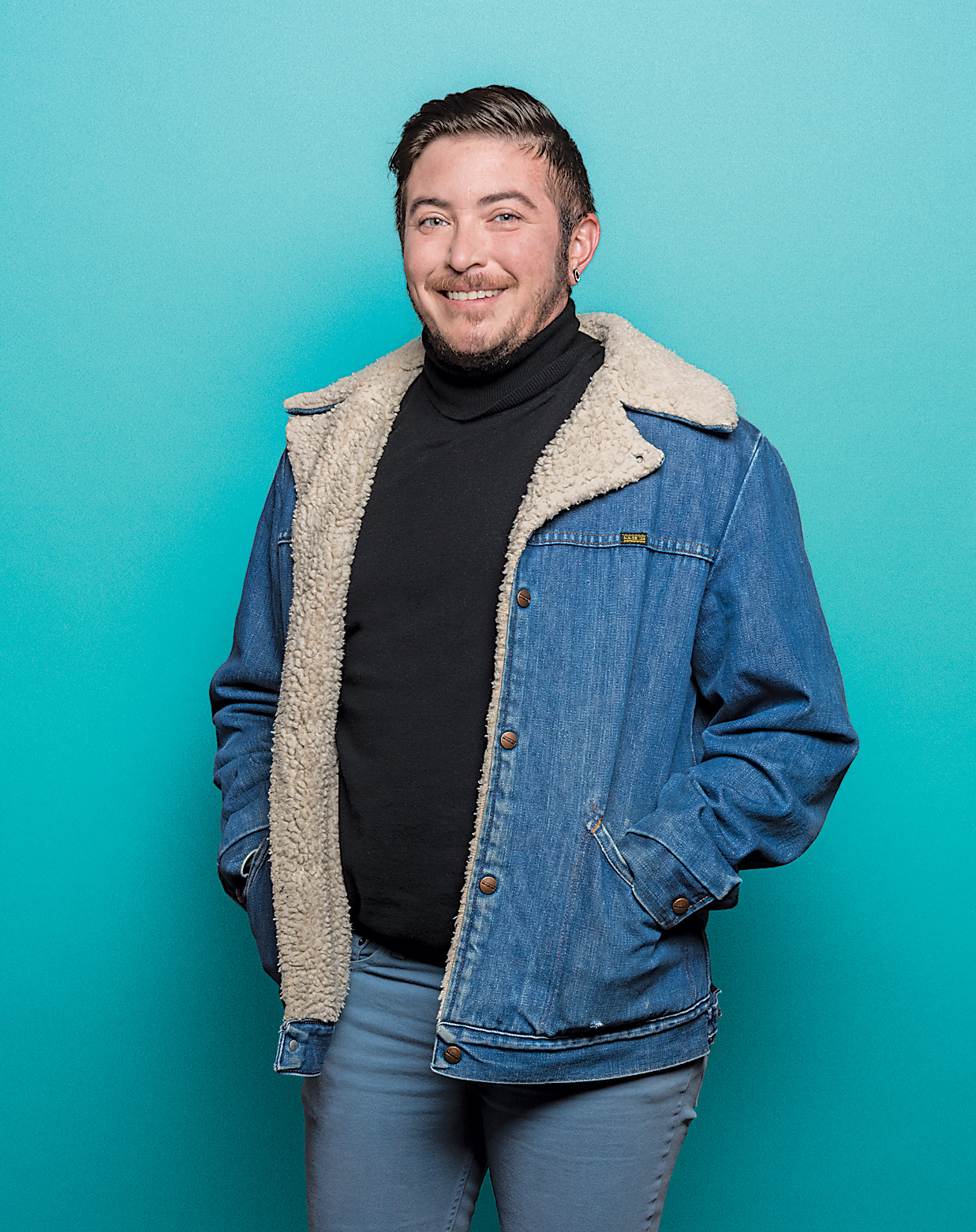
JAIMES mayhew
Artist, educator, 38
I’m from Littleton, CO. I went to Columbine High School. My little brother was there when the shooting happened. One of the South Park creators also grew up in Littleton, which was really conservative, super born-again Christian. Just coming out as not straight, anything different in terms of sexuality, was not acceptable. But in high school, I did come out as a lesbian before I transitioned—I didn’t even know what trans was then. I went to a big high school, close to 2,000 students, and just two people were out. Me and a gay male student. There was a lot of bullying, but I did have support from our small group.
I took my high-school girlfriend to the prom, but initially the school wouldn’t let me buy a “couples” ticket. They told me I had to buy two “singles” tickets, and I refused. The school then called my parents and reported me, informing them that I wanted to go the prom with another girl and that they were “worried” about me. My parents weren’t happy. They were already scared about me being “out” in public, imagining it would have all kinds of negative consequences. The prom was amazing, though. I had a job at Orange Julius and only had enough money for our tickets—I finally did get couples tickets—but not enough for real prom outfits. So we wore princess dresses instead and went out for dinner at Burger King. It was all we could afford, but we had a great time.
I was living not far from Columbine after the shooting and decided it was a good time to move. I spent time in Boston, attending Lesley University, a humanities college. Then I took $500 from my tax return and went on a road trip to Seattle, where I saw two gay men holding hands and not being ostracized. I decided to work and save money and go back to Seattle, where I met some other transitioning people, and ended up living there for four years. What really helped was meeting my friend Jason. We talked a lot about gender. We discussed different sexual characteristics, different physical characteristics—and how your identity is connected to these things. He was my mentor basically. In art school in Seattle, I decided I was going to do a long-term performance piece that I was male. That was 2002, and it just never stopped. I got in touch with a doctor and jumped through all the hoops, going through six months of therapy to “prove” that you are truly trans, and he signed off and wrote a prescription for hormone treatment.
But I suddenly became the subject of everybody’s photo project in art school and didn’t like that.
But I suddenly became the subject of everybody’s photo project in art school and didn’t like that. So, I moved back to Boston, transferred to Emerson College, and tried to live stealth, which works for some people, but doesn’t for me.
My first job in Boston after college was at a cable-access TV station, where I started getting harassed by a coworker who was not on board with the trans thing. It was a small organization, no HR department, and I could get a lawyer or leave—and I decided it was easier to leave. Later, when UMBC said they would pay for my MFA, I thought, “Okay, I’m going to live there.”
My little brother is super supportive. My folks eventually came around. When I first told my mother about my desire to transition, I was living in Seattle, and she told my father and he drove 24 hours to see me. He was asleep in the alley in his car when I came home. He said he’d take me out to a nice place for dinner, and I picked somewhere really expensive. He finally said, “So I hear you are getting a sex change.” It felt like the whole restaurant went quiet. I was completely mortified.
In general, in society, it’s easier for a trans man to pass than a trans woman. We have so many more gender identifiable traits for women, which I think is what makes them more susceptible to violence. There are a lot of real issues, like wage gaps for trans men and trans women. The landscape is shifting, but it is still a hard time to be trans, especially if you don’t have family support.
